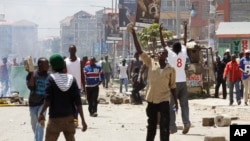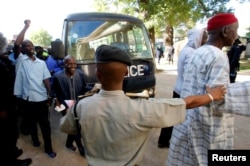Africa doesn’t take top billing in this year’s roundup of global human rights concerns. That dubious honor goes to the “dangerous trend” of intolerance and populist leadership in the United States, Russia and China, which Human Rights Watch says are setting a poor example for the rest of the world.
But, says the organization’s deputy program director, Babatunde Olugboji, that doesn’t mean the respected rights watchdog is taking their eye off Africa even as they air their concerns about aggressive, anti-immigrant talk coming from traditional power centers.
“We need to be concerned because human rights... we need to sort of look at it it at the individual level,” Olugboji told VOA in Johannesburg, where the report was launched.
“Women who have been raped, people who have been killed, people who have been arrested, people who have been detained, they’re not going to be thinking of nuclear war in Korea or in Hawaii or anywhere. They’re going to be thinking of, ‘my government has the responsibility to respect my rights, my government has the responsibility to ensure that I enjoy these rights,’” he said.
Clampdowns and bright spots
In many ways, said Olugboji and his colleagues, African nations have failed.
They described concerns in West Africa about armed groups like Boko Haram, crackdowns on the the English-speaking minority in Cameroon, and continuing unrest in the Democratic Republic of Congo, which has repeatedly postponed elections and reacted harshly to political protests.
In East Africa, they noted clampdowns on dissent in Ethiopia and in Tanzania, and concerns about election-related violence in Kenya and continuing violence ahead of South Sudan’s increasingly unlikely elections.
But researchers also noted bright spots in Gambia and in Angola, where longtime leaders finally stepped aside and freedoms are slowly, possibly growing.
Angola researcher Zenaida Machado says that while things appear to be going well since the retirement of longtime leader Jose Eduardo Dos Santos in September, it’s too soon to call the Southern African nation a success. After all, she said, most of the year was still characterized by his increasingly repressive leadership and his high-profile family’s.
“It was an exciting period for Angola, it’s been, since September, but it’s also important not to forget that the year was still there from January until September 2017, when changes began to be implemented, or begun to be seen,” she said. “The majority of 2017 wasn’t a good year for Angola.”
Olugboji said that he is reserving judgment about Zimbabwe, where the military forced President Robert Mugabe to resign in November after 37 years in power. He has been replaced by his longtime deputy, Emmerson Mnangagwa.
“Not much has changed in Zimbabwe,” he said. “There was this euphoria about Mugabe being pushed out, but when the dust settled it became clear that these people that have been there forever... Nothing has changed -- there are restrictive laws on the books, there are issues around freedom of expression, the press is not free, people cannot protest."
African governments, he said, may feel the heat is off them because of the world’s bigger, louder, more controversial leaders. But that, he said, would be a mistake: Human Rights Watch is always watching.





